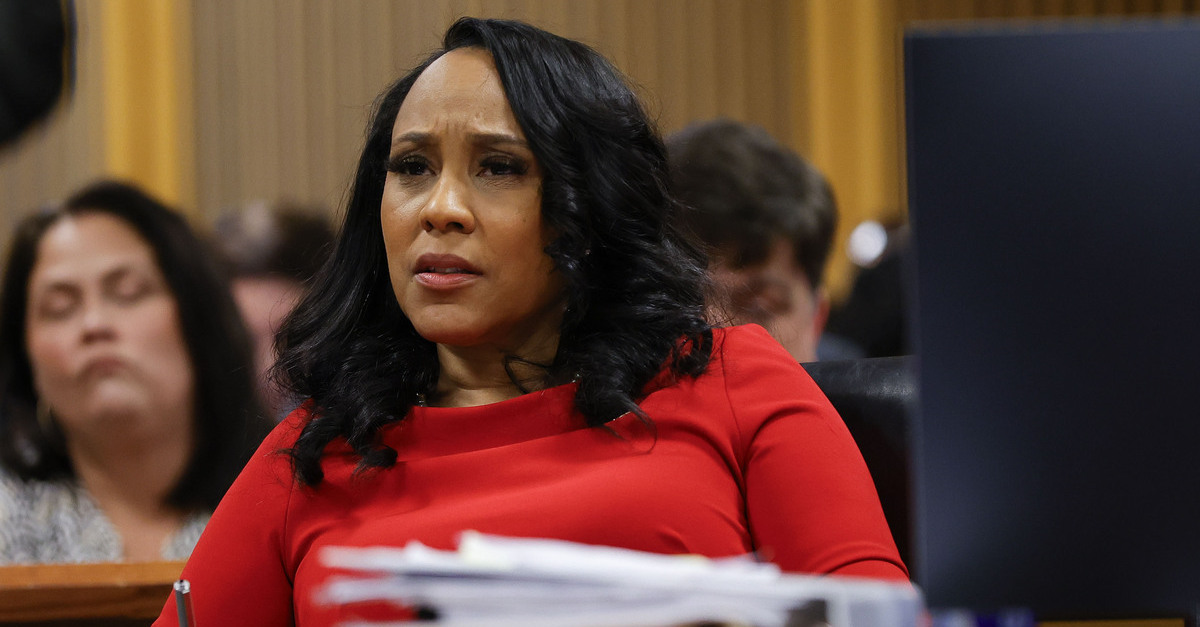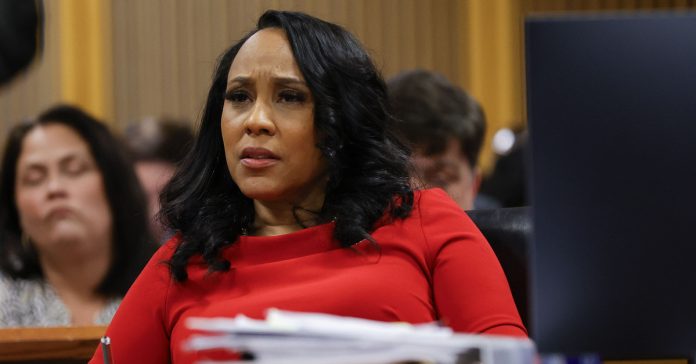
Fulton County District Attorney Fani Willis looks on during a hearing on the Georgia election interference case, on Friday, March 1, 2024, in Atlanta. (AP Photo/Alex Slitz, Pool)
A senior prosecutor in the Atlanta area has evidence suggesting Fulton County District Attorney Fani Willis and special prosecutor Nathan Wade began their romantic relationship several years before the embattled pair testified it started, a Monday court filing alleges.
The latest salvo in the monthslong effort to disqualify Willis from the racketeering (RICO) and election interference case she brought against Donald Trump comes in an eleventh-hour motion to reopen the evidence. That motion seeks to subpoena a new witness and was filed by co-defendant David Shafer, the onetime Georgia GOP chairman who prosecutors claim was integral to the fake electors plot.
Shafer’s filing, prepared by attorney Craig Gillen, alleges the new witness will substantiate claims made by Terrence Bradley regarding the timeline of the DA’s relationship with the man she put in charge of the most consequential criminal case in Peach State history. At the same time, the motion also says the new witness will refute a key part of Bradley’s testimony about the nature of his prior claims.
After watching Bradley’s testimony, Co-Chief Deputy District Attorney for Cobb County Cindi Lee Yeager spoke with two defense attorneys on the phone and took issue with many statements made by Nathan Wade’s former divorce attorney and law partner, the filing says.
Bradley, in text messages to defense attorney Ashleigh Merchant, said the two “absolutely” began dating before Willis hired Wade. He also said, with an air of certainty, the affair began when Willis was a municipal court judge — giving it a romantic vintage of 2019-2020.
On the stand last week, however, Bradley was little more than evasive. He hedged and blurred his prior statements by saying those claims were based on a lone conversation with Wade but, ultimately, nothing more than speculation. And, he adamantly refused under oath to offer anything close to a date for when the relationship began — saying he could not recall why he previously seemed to be so sure about the timeline.
Yeager says Bradley made several statements on the stand “directly contrary” to what he told her during “numerous” conversations between August 2023 and January 2024, the filing claims.
“Mr. Wade had definitely begun a romantic relationship with Ms. Willis during the time that Ms. Willis was running for District Attorney in 2019 though 2020,” the filing claims Bradley told Yeager. “Mr. Bradley stated that he had personal knowledge of the relationship between Mr. Wade and District Attorney Willis.”
Closing arguments in the disqualification matter have already occurred — but that is not much of a barrier should Fulton County Superior Court Judge Scott McAfee decide Yeager’s evidence is worth hearing under oath. Trial court judges in Georgia have wide latitude to reopen the evidentiary record — they can do so more or less at will.
In this particular case, both the state and Trump himself have requested, prior to Shafer’s filing, that the evidence be reopened. Last week, McAfee said it would probably take him around two weeks to finally rule on the motion to disqualify Willis and her office.
During their closing, the state repeatedly referenced the testimony of another witness, Robin Yeartie, a former employee of the Fulton County District Attorney’s Office who said she and Willis had long been “best friends.” During the first day of the hearing, Yeartie testified Willis and Wade first became romantic in late 2019.
During the hearings, both the prosecutors and the defense addressed claims that Willis and Wade used a condominium she rented from Yeartie as a romantic meetup location. Cellular phone records legally obtained by the defense suggest Wade visited the condo on numerous occasions and likely spent the night there on two occasions prior to the admitted time when the affair began.
The Shafer filing references this aspect of the case, alleging Bradley told Yeager “details regarding” Willis’ and Wade’s “use of Ms. Robin Yeartie’s apartment and other meetings prior to November 2021.”
The crux of the defense’s argument for removing Willis and Wade is that the district attorney hired her then-boyfriend for the job in November 2021 and reaped something akin to a financial windfall.
The financial aspect of the allegations against the prosecutors are only obliquely referenced in the Shafer filing — if at all.
But, the money-related aspect of the latest defense motion includes a potentially separate pitfall for Willis herself.
In his own testimony, Bradley gave the impression that he rarely, if ever, spoke to Willis. On the stand last month, he testified that he “did not personally know” her and said: “My interaction with Ms. Willis was never where I would pick up the phone and talk to her.”
According to the filing, Yeager will directly contradict Bradley’s in-court estimation of his relationship with Willis.
From the motion, at length (emphasis in original):
In or around September of 2023, Mr. Bradley was visiting Ms. Yeager in her office when Mr. Bradley received a telephone call. Ms. Yeager could hear that the caller was District Attorney Willis. District Attorney Willis was calling Mr. Bradley in response to an article that was published about how much money Mr. Wade and his law partners had been paid in this case. Ms. Yeager heard District Attorney Willis tell Mr. Bradley: “They are coming after us. You don’t need to talk to them about anything about us.”
Defense attorneys have tried to make hay out of claims that Wade has been overpaid for his work and is otherwise not sufficiently qualified for the job his then-girlfriend allegedly hired him to do. Those arguments have not made much traction in McAfee’s courtroom.
The bigger issue with Yeager’s alleged claim about the phone call, rather, is if Bradley misrepresented his relationship with the district attorney — and the district attorney’s office did not correct the record for the court. If the judge finds Yeager, a neighboring prosecutor, a credible witness, that could spell big trouble for the prosecution.
Have a tip we should know? [email protected]

